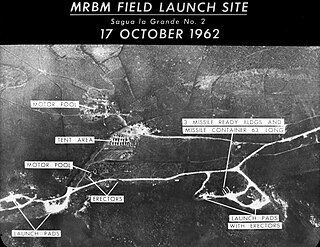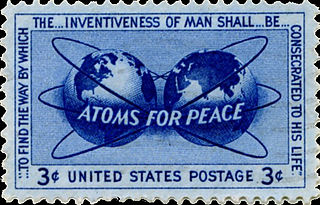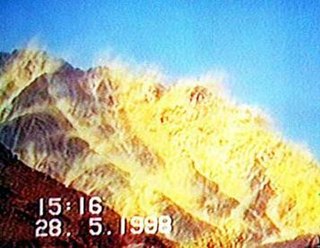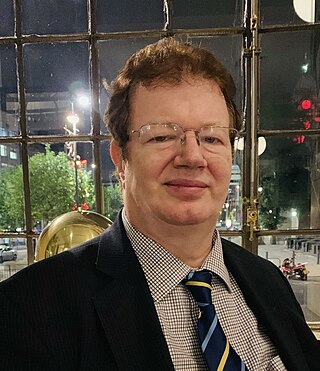
A nuclear weapon is an explosive device that derives its destructive force from nuclear reactions, either fission or a combination of fission and fusion reactions, producing a nuclear explosion. Both bomb types release large quantities of energy from relatively small amounts of matter.

Nuclear warfare, also known as atomic warfare, is a military conflict or prepared political strategy that deploys nuclear weaponry. Nuclear weapons are weapons of mass destruction; in contrast to conventional warfare, nuclear warfare can produce destruction in a much shorter time and can have a long-lasting radiological result. A major nuclear exchange would likely have long-term effects, primarily from the fallout released, and could also lead to secondary effects, such as "nuclear winter", nuclear famine, and societal collapse. A global thermonuclear war with Cold War-era stockpiles, or even with the current smaller stockpiles, may lead to various scenarios including human extinction.

Mutual assured destruction (MAD) is a doctrine of military strategy and national security policy which posits that a full-scale use of nuclear weapons by an attacker on a nuclear-armed defender with second-strike capabilities would result in the complete annihilation of both the attacker and the defender. It is based on the theory of rational deterrence, which holds that the threat of using strong weapons against the enemy prevents the enemy's use of those same weapons. The strategy is a form of Nash equilibrium in which, once armed, neither side has any incentive to initiate a conflict or to disarm.

World War III, also known as the Third World War, is a hypothetical future global conflict subsequent to World War I (1914–1918) and World War II (1939–1945). It is widely assumed that such a war would involve all of the great powers, like its predecessors, as well as the use of nuclear weapons or other weapons of mass destruction, surpassing all prior conflicts in geographic scope, devastation and loss of life.

Brinkmanship or brinksmanship is the practice of trying to achieve an advantageous outcome by pushing dangerous events to the brink of active conflict. The maneuver of pushing a situation with the opponent to the brink succeeds by forcing the opponent to back down and make concessions rather than risk engaging in a conflict that would no longer be beneficial to either side. That might be achieved through diplomatic maneuvers, by creating the impression that one is willing to use extreme methods rather than concede. The tactic occurs in international politics, foreign policy, labor relations, contemporary military strategy, terrorism, and high-stakes litigation.

Building on major scientific breakthroughs made during the 1930s, the United Kingdom began the world's first nuclear weapons research project, codenamed Tube Alloys, in 1941, during World War II. The United States, in collaboration with the United Kingdom, initiated the Manhattan Project the following year to build a weapon using nuclear fission. The project also involved Canada. In August 1945, the atomic bombings of Hiroshima and Nagasaki were conducted by the United States, with British consent, against Japan at the close of that war, standing to date as the only use of nuclear weapons in hostilities.

The nuclear arms race was an arms race competition for supremacy in nuclear warfare between the United States, the Soviet Union, and their respective allies during the Cold War. During this same period, in addition to the American and Soviet nuclear stockpiles, other countries developed nuclear weapons, though no other country engaged in warhead production on nearly the same scale as the two superpowers.
Grand strategy or high strategy is a state's strategy of how means can be used to advance and achieve national interests in the long-term. Issues of grand strategy typically include the choice of military doctrine, force structure and alliances, as well as economic relations, diplomatic behavior, and methods to extract or mobilize resources.

Canada has not officially maintained and possessed weapons of mass destruction since 1984 and, as of 1998, has signed treaties repudiating possession of them. Canada ratified the Geneva Protocol in 1930 and the Nuclear Non-proliferation Treaty in 1970.

Deterrence theory refers to the scholarship and practice of how threats of using force by one party can convince another party to refrain from initiating some other course of action. The topic gained increased prominence as a military strategy during the Cold War with regard to the use of nuclear weapons and is related to but distinct from the concept of mutual assured destruction, according to which a full-scale nuclear attack on a power with second-strike capability would devastate both parties. The central problem of deterrence revolves around how to credibly threaten military action or nuclear punishment on the adversary despite its costs to the deterrer. Deterrence in an international relations context is the application of deterrence theory to avoid conflict.

The Single Integrated Operational Plan (SIOP) was the United States' general plan for nuclear war from 1961 to 2003. The SIOP gave the President of the United States a range of targeting options, and described launch procedures and target sets against which nuclear weapons would be launched. The plan integrated the capabilities of the nuclear triad of strategic bombers, land-based intercontinental ballistic missiles (ICBM), and sea-based submarine-launched ballistic missiles (SLBM). The SIOP was a highly classified document, and was one of the most secret and sensitive issues in U.S. national security policy.

Military geography is a sub-field of geography that is used by the military, as well as academics and politicians, to understand the geopolitical sphere through the military lens. To accomplish these ends, military geographers consider topics from geopolitics to physical locations’ influences on military operations and the cultural and economic impacts of a military presence. On a tactical level, a military geographer might put together the terrain and the drainage system below the surface, so a unit is not at a disadvantage if the enemy uses the drainage system to ambush it, especially in urban warfare. On a strategic level, an emerging field of strategic and military geography seeks to understand the changing human and biophysical environments that alter the security and military domains. Climate change, for example, is adding and multiplying the complexity of military strategy, planning and training. Emerging responsibilities for the military to be involved in: protection of civilian populations, women and ethnic groups; provision of humanitarian aid and disaster response (HADR); new technology and domains of training and operations, such as in cybergeography, make military geography a dynamic frontier.
If a general desired to be a successful actor in the great drama of war, his first duty is to study carefully the theater of operations so that he may see clearly the relative advantages and disadvantages it presents for himself and his enemies.

"Atoms for Peace" was the title of a speech delivered by U.S. President Dwight D. Eisenhower to the UN General Assembly in New York City on December 8, 1953.
I feel impelled to speak today in a language that in a sense is new—one which I, who have spent so much of my life in the military profession, would have preferred never to use. That new language is the language of atomic warfare.
Able Archer 83 was a military exercise conducted by NATO that took place in November 1983, as part of an annual exercise. It simulated a period of heightened nuclear tensions between NATO and the Warsaw Pact, leading to concerns that it could have been mistaken for a real attack by the Soviet Union. The exercise is considered by some to be one of the closest moments the world came to nuclear war during the Cold War. The purpose of the exercise, like previous years, was to simulate a period of conflict escalation, culminating in the U.S. military attaining a simulated DEFCON 1 coordinated nuclear attack. The five-day exercise, which involved NATO commands throughout Western Europe, was coordinated from the Supreme Headquarters Allied Powers Europe (SHAPE) headquarters in Casteau, Belgium.
Andrew Richter is a Canadian political scientist who is an assistant professor in the department of political science at the University of Windsor in Windsor, Ontario, Canada.

Project-706, also known as Project-786 was the codename of a research and development program to develop Pakistan's first nuclear weapons. The program was initiated by Prime Minister Zulfiqar Ali Bhutto in 1974 in response to the Indian nuclear tests conducted in May 1974. During the course of this program, Pakistani nuclear scientists and engineers developed the requisite nuclear infrastructure and gained expertise in the extraction, refining, processing and handling of fissile material with the ultimate goal of designing a nuclear device. These objectives were achieved by the early 1980s with the first successful cold test of a Pakistani nuclear device in 1983. The two institutions responsible for the execution of the program were the Pakistan Atomic Energy Commission and the Kahuta Research Laboratories, led by Munir Ahmed Khan and Abdul Qadeer Khan respectively. In 1976 an organization called Special Development Works (SDW) was created within the Pakistan Army, directly under the Chief of the Army Staff (Pakistan) (COAS). This organization worked closely with PAEC and KRL to secretly prepare the nuclear test sites in Baluchistan and other required civil infrastructure.

An anti-war movement is a social movement, usually in opposition to a particular nation's decision to start or carry on an armed conflict. The term anti-war can also refer to pacifism, which is the opposition to all use of military force during conflicts, or to anti-war books, paintings, and other works of art. Some activists distinguish between anti-war movements and peace movements. Anti-war activists work through protest and other grassroots means to attempt to pressure a government to put an end to a particular war or conflict or to prevent one from arising.
Broken-backed war theory is a form of conflict that could happen after a massive nuclear exchange. Assuming that all participants have not been annihilated, there may arise a scenario unique to military strategy and theory, one in which all or some of the parties involved strive to continue fighting until the other side is completely defeated.

Christoph Hartmut Bluth is a professor of international relations and security at the University of Bradford.














